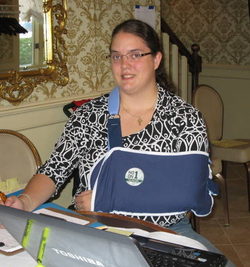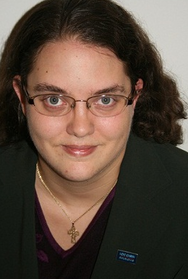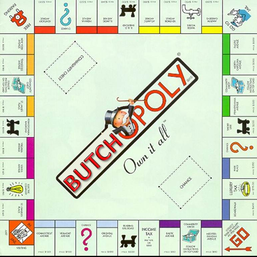 via zazzle.com Today I realized it's been over a year since I started this blog. It began as a random project to let me opine about butch fashion, gender expression, etc. Since then, BW has grown to over 1000 unique readers daily (40,000-50,000 monthly!) and been voted About.com's Best Lesbian Blog of the Year. You've commented over 1000 times to my over 150 posts. Wow, dear readers. I didn't expect to enjoy writing BW this much. Yeah, I love writing. And yeah, I care about these issues. But I wasn't expecting to receive hundreds of emails saying that a blog entry made you think, or made you laugh, or helped you get through your day in some small way. Thank you so much for reading. It means a whole lot to this butch. I hope this year will be even better. I want to keep writing stuff you enjoy and find relevant, keep giving you solid fashion advice, and keep starting different dialogues about gender and sexual orientation. I want to finally flesh out the Butch Store, have more guest posts, and make occasional video or audio postings. Maybe we'll grow, maybe not. Maybe I'll finally break even on this thing (ha!), maybe not. But regardless, we're all going to have a really freakin' good time and keep building this community of readers, butches and non-butches alike. Whether you're a new reader or a longtime one: thank you for making this year awesome. Love, hugs, and fistbumps, Butch Wonders P.S. Some of you have written asking if I've covered particular topics. This weekend, I'll make an index that should be easier to navigate than the usual post tags, and will help you see what I've written about various things. P.P.S. Thanks again. You rock.
7 Comments
If you're like me, you think that the Republican Party's stance on civil rights issues makes lesbianism as compatible with Republicanism as horseradish is with chocolate. But the Log Cabin Republicans disagree. They're a national organization of openly gay GOP members who want to strengthen the Republican Party, limit government, promote free markets, and advocate for LGBT equality. Intrigued, I contacted Log Cabin and asked for an interview with a member. I soon heard back from Casey Pick, Programs Director at the organization's national office, who is an out butch lesbian. She graciously agreed to an IM interview for BW, which I've printed here (edited only for length and clarity). Unless otherwise specified, her answers are hers alone and not that of the Log Cabin Republicans.  Pick in action, undeterred by injury BW: Thank you so much for agreeing to talk to me. I really appreciate your time. CP: Absolutely. I enjoyed reading your blog earlier, so I've been looking forward to this. BW: Thanks for reading! I'd love to start by asking a little about you. You're in your late 20s, and a graduate of UCLA Law School, is that right? CP: That's correct. I'm a proud Bruin, and a licensed attorney in the state of California. Now I'm the programs director for the National Log Cabin Republicans. BW: Have you been a Republican since you were young? CP: No, I became a Republican in college, shortly after the 2004 elections. That's quite a story. BW: I'd love to hear it. I was guessing that you've always identified as Republican, then came out later in life as a lesbian. CP: I'd always been pretty moderate, but sort of a "Democrat by default," especially after I realized my orientation in high school. But when I went to college at Claremont McKenna, I started to really define my political views, discovering that I was much more of a national security hawk--I was strongly affected by the 9/11 attacks--and that I really did believe in a free market and conservative political philosophy. BW: That's interesting. CP: But still, I was more concerned about gay rights than party politics, so I didn't make the change until two big things happened. CMC invited Patrick Guerriero, then Executive Director of Log Cabin Republicans to speak, and I really admired the work he was doing to change the party from within. The second thing was when I watched Democrats, after losing in 2004, start blaming Kerry's loss on LGBT people, and talking about how the Democratic Party needed to get in with religious voters.  Casey Pick in her lez-baru BW: What was the political climate like at Claremont McKenna? CP: CMC is a special place. It is one of the only schools I know of where the student body splits pretty evenly into liberal/conservative/independent, and we've been called the most political campus in the country. Add to that a really strong emphasis on leadership and studying government, and you have a politics wonk's dream! BW: Did you grow up in California? CP: I was born in CA and lived there until my mother decided to go to law school when I was 10 or so. We moved to Iowa, but I kept going back to CA during the summer, so it never really stopped feeling like home. BW: I bet you miss it! CP: I do! I've got plane tickets in hand for a trip to Palm Springs this summer, actually. BW: So when you began to ID with a conservative political philosophy, did you feel tension between your sexual orientation and new political leanings? CP: Given that it was 2004, and I had just watched 11 states pass constitutional amendments banning marriage equality, I knew there was work to be done in the GOP. It was very important to me, knowing that I was a conservative at heart--and also a newly born-again Christian... it was an intense time - it was important that I use my ability to speak, Republican-to-Republican, evangelical-to-evangelical, in order to change hearts and minds for equality. I was going to be a Republican, but I wasn't going to abandon my pro-equality principles at the door. And frankly, I believe the GOP's core principle of freedom and individual liberty is entirely in line with LGBT equality. BW: Did your Christian beliefs cause any tension re: your sexual orientation? CP: I became a Christian after really getting to know and love some of my evangelical neighbors at CMC, so they knew I was gay and welcomed me from the start. I will say that my orientation, and a long fear of Christians/God, made it harder to accept my faith, but now I reconcile the two happily, and enjoy helping others do the same. It's a theme in my life - I like to be a bridge. BW: I agree that freedom and individual liberty is in line with LGBT equality. But I'm skeptical of the idea that freedom and individual liberty are in line with the Republican agenda. Economic freedom and deregulation, yes. Social freedom, no. CP: Well, there are many Republicans who believe, as Vice President Dick Cheney said, "freedom means freedom for everyone" - and on issues like LGBT liberty, more Republicans are coming on board every day. BW: More may be coming on board. But in absolute numbers, it still seems low compared to Democrats. CP: The LGBT community has spent a long time investing in and educating the left side of the aisle. I find it unfortunate that we've conceded territory on the right for so long that now Democrats sometimes take our votes for granted. Log Cabin Republicans is working hard to do much of that same work on the right, and it's bearing results - I'd point to important votes on "Don't Ask, Don't Tell" repeal, or to marriage in NY, WA and NH as examples of where hard work pays off. BW: But if the Republican Party really believed in getting out of our personal lives, wouldn't they be totally accepting of LGBTQ folks? CP: We have to remember that the movement for LGBT equality, slow as it may seem, has actually moved very fast. As a matter of political philosophy, conservatives tend to be more cautious of social change in general, and the reality is that a large portion of this nation is still coming to grips with what it means for gay people to be out, proud, and forming families. BW: But if conservatives supposedly care about personal freedom, why do they tend to be cautious about social change? CP: A lot of times, what is marketed as change - as in, say, a "hope and change" agenda - is really about giving government more control. At the same time, it's about the law of unintended consequences - if we change this, what happens next that we can't see? This is the academic, geeky butch coming out in me - it's Burke, Hayek, that kind of political philosopher that says beware radical changes, and to a lot of folks, LGBT rights still seem radical. But as people learn that we're just like them, interested in going to work, raising our families, sometimes serving our nation in uniform - the more they learn that, the less radical we seem and the more progress we make among conservatives. BW: The fact that we have to "convince" Republicans that we're "just like them" suggests to me they DO care about getting into our personal lives. CP: It isn't so much about your personal life as about what society looks like as a whole. Conservatives often believe that a self-governing society, one which can maintain a high level of freedom, requires strong families and other private institutions to provide stability. BW: The values you're articulating sound more Libertarian than Republican. CP: The GOP, like the Democrats, isn't a monolith. We're a coalition which includes your libertarians, your national security hawks, your social conservatives, and so on, and we don't always agree. BW: The idea that strong private institutions should be a source of social stability is another place you and I diverge. I'm wary of the idea that private institutions--that are hard to hold accountable--should be a big source of social stability. Look at outsourcing. I'd argue that insufficient regulation is why we have such a withered manufacturing base. CP: And I'd come back pointing out that we have some of the highest corporate tax rates and most burdensome regulations in the world. I think we'd enjoy a debate over a couple of beers. BW: Agreed. CP: Btw, I enjoyed reading your field guide on types of butch lesbians--I'm going to be thinking about that for awhile!  photo credit: Amy Walter Beisel BW: Thanks. Do you ID as butch? Which one are you? CP: I'm slightly on the butch side of the spectrum. All about holding open doors, being protective, and let's just say not a lot of work got done during the women's NCAA basketball tournament! BW: Okay, back to The Gays: What’s your reaction to Obama’s stance re: gay marriage? CP: Obviously it's tremendously significant, and having the president on the right side of this issue is in the nation's best interests. That said, Americans can be certain that the President would not have made this decision at this time if it were not in his best political interests. ...the trap is laid for any Republican who responds with intolerance. I think a lot of Republicans know this, which is why you're seeing a pretty mild, measured response, particularly from people like Speaker Boehner and Governor Romney, who is only bringing it up when asked so far. BW: Do you see gay rights as a states' issue? CP: I will say I was very disappointed in the timing of the announcement. I was on the ground in North Carolina working against Amendment One, and I know that there were a lot of people there who were hurting at that defeat, who are asking now why the president couldn't have come out for this one day sooner, which it might have made a difference for them. So while I'm happy he's finally caught up to Dick Cheney on this, in a way the timing of it just made it bittersweet. BW: Do you agree with Cheney that it's a states' rights issue? CP: Log Cabin Republicans are working hard to pass a federal employment nondiscrimination act and other important legislation for LGBT Americans at the federal level - but we do sometimes make the argument that the federal government should show more respect for the states. To conservatives, it is a strong argument to remind them that the federal Defense of Marriage Act was actually an unprecedented intrusion on states' rights, and that today it is actually working in an anti-federalist way by allowing - forcing, even - the federal government to ignore marriages in states like New York and New Hampshire where the state has decided to grant marriage rights. If we treated marriage like a states rights issue, we'd be recognizing those marriages today for purposes of federal benefits like social security and taxes. That said, we do agree with former Bush administration solicitor general Ted Olson that marriage is a fundamental freedom due to all Americans, gay or straight. BW: Ted Olson is an excellent advocate. Do you think it would hurt Romney politically if he came out in favor of gay marriage? Or, put differently, do you think that the Republicans have basically given up on getting the gay vote? CP: There is a growing number of Republicans leaders who are aware that campaigning on marriage, or even appearing antigay in any way, is a losing strategy for the GOP. I'd point you to an article in the Washington Post which shows more and more Republicans strongly encouraging the party to take a more modern stance on these issues. That said, social issues activists like the National Organization for Marriage and the Family Research Council aren't going away just yet. BW: It must be annoying to you that so many visible Republicans are so anti gay rights. CP: It isn't just about the gay vote at this point - those gay voters have friends, family, co-workers, and polls are consistent in showing that moderates, younger voters and women are inclined to support equality. It's a growing voting block to be taken into consideration. It's frustrating sometimes, not just because as a gay woman I find some of what is said offensive, but also because I think that kind of rhetoric is harmful to the Republican Party. BW: You think Romney would lose votes if he came out in favor of equal rights for LGBTQ Americans? CP: I think there are some measures Governor Romney could comfortably take to reach out on issues of equality, including support for employment nondiscrimination. On marriage, I think he has stated his position and intends to stay with it, though Log Cabin Republicans have informed him of our disagreement and strong desire to see DOMA repealed. BW: Do you foresee Obama repealing DOMA if he's elected again? CP: The question is whether I see him investing significant political capital to move DOMA repeal through Congress. Given his anemic efforts on DADT repeal and broken promises on the federal contractor executive order against employment discrimination, I'm not optimistic. BW: [Sigh.] Me either re: his political capital. [Though I'll definitely be voting for him come November.] CP: See? Not only is a lesbian Log Cabin Republican not a unicorn, I'm also not crazy! BW: You've been super generous with your time. A couple more questions? CP: Sure. BW: I listened to another interview with you, and the interviewer was literally yelling at you for being a gay Republican. Do you get that a lot? CP: Especially this week! Our statement in response to President Obama ruffled a few feathers. But yeah, there are plenty of people who don't understand how a person can stay in a party where there is significant disagreement on something as personal as marriage and families. I remind them that I am a multifaceted human being who cares about a lot of issues; that somebody has to be willing to speak with the right side of the aisle if we're ever going to truly win equality; and that it's my party, too - I'm not about to be driven out of it or told I can't be a Republican. We won't have real freedom as LGBT people in this country if there's still the idea out there that your sexual orientation dictates your politics. BW: To me, civil rights are so personal that it would be hard to be a member of a party whose official platforms suggested that I was inferior. CP: Civil rights matter to me, too - that's why I do this work. I think the most important battleground for equality today is with people who disagree with us, and if I have the knowledge, perspective and, frankly, stubbornness to have those conversations, then it's my job to do so. Log Cabin Republicans are unapologetically Republican and unapologetically pro-equality, and that's why I'm proud to be a member. BW: Although I disagree with you in many ways, I'm glad that there are people like you in the Republican Party. CP: We need folks on the left pushing Democrats, too, so if you're not a Republican, you've still got work to do. I'm happy to work with other advocates to get things done. Log Cabin works with Freedom to Marry, Immigration Equality, Servicemembers United, GLSEN, to make equality a reality. BW: Here's a question I know a lot of readers are wondering: does being a Republican affect your dating life? CP: Being a workaholic political activist affects my dating life! BW: I can just imagine it. Candlelit dinner, romantic music... then all of a sudden, you say it: "Honey, I'm a Republican." Do you encounter a lot of women who are just like, "I totally don't get you." CP: To be honest, yes- there are some folks who find it a turn-off, who think I must be self-loathing or fundamentally greedy, willing to trade equality for tax cuts. For others, it's not the Party, but being deeply involved in these issues. Thankfully, it rarely gets that far - when the answer to the question "so what do you do?" is "I lobby Republicans for gay rights," that screens out those types pretty effectively. BW: I bet. Do you prefer to date other Republicans? CP: Lol! If that was my criterion, I'd be in trouble. I prefer to date people who are passionate about whatever they believe in. Clearly I'm comfortable with liberals and have plenty of lefty friends - I don't discriminate. BW: Who's your dream woman? Ann Coulter? Rachel Maddow? CP: *shudders* No thank you. BW: Shudders to whom? Both of 'em? CP: Pretty much, though Rachel has her moments. BW: LOL--if she was a conservative, you know you'd be all over that. CP: No doubt! Sadly, she's not so fond of Log Cabin types. BW: Maybe she'll invite you on her show one of these days. CP: I think I'd enjoy that conversation - sparks would fly, just not romantically! BW: Well, I should wrap up, but just want to say thanks again. It's been fun talking with you, Casey. CP: Anytime - it's been a nice break. BW: Good luck. CP: Thanks.  By Butch Jaxon of Butch on Tap I was playing Monopoly on my smart phone and it got me thinking… What if there was a butch-themed Monopoly game? What would the game look like? Traditionally, Monopoly has 8 sets of colored properties, 2 utilities, and 4 railroads to buy. Hazards include 2 kinds of taxes and, of course, jail. The pieces a player gets to choose from are: battleship, cannon, dog, iron, race car, shoe, thimble, top hat, and wheelbarrow. If I were to butch up Monopoly, it might look something like this: The properties would be 8 different breweries, with my 3 favorite beers from each. The utilities would be Home Depot and Target (a butch can get everything she needs for daily living at these two stores, minus clothes and food). The tax squares would be classic butch problem situations resulting in the payment of a Femme Tax. One would be: “You’ve been caught staring at another woman; buy your femme flowers to try to fix it.” The second: “You have no idea what your femme is trying to tell you so you have to hire a translator to save your dumb ass.” Community Chest becomes Femme Chests and includes cards explaining a variety of things you do that are “Butch Fails” and will send you directly Butch Jail – do not pass go, do not collect $200. But, it’s all right because Butch Jail is staffed by sexy femme prison guards. Meow. The pieces would be transformed like this: Battleship = Polar Bear, because they are big and powerful like a battleship, but not charged with that militaristic, gas-guzzling, establishment, gay-hating aura that the armed forces have. Dog = Shark. Remember, sharks are hella butch. Iron = Toolbox. Obviously. Race car = This is my favorite piece, so it would stay. Model it after a Shelby Cobra, though. Shoe = Engineer boot. Very butch. Top hat = Bow tie. ’nuff said. Wheelbarrow = Big beer bottle. Thimble = BBQ grill. Now, who wants to play? You can read more from BW guest author Butch Jaxon at butchontap.com. On Wednesday, I argued that the national excitement over Obama's support for gay marriage was overblown. A recent Gawker article pointed out that the ABC news coverage made it clear that the President still believes gay marriage should be a state-by-state issue.
Assuming this is true, I have even less respect for President Obama's announcement than I did on Wednesday. Civil rights are not a state-by-state issue. This is, largely, the point of our Constitution: to protect the rights of those who are not the majority; to make sure that unpopular beliefs aren't treated less fairly than those held by the majority. It absolutely frosts me that even Democratic politicians can get away with saying that states should decide gay rights. Really? Just like states should be able to decide whether women can vote? Just like states should be able to decide whether blacks can marry whites? Just like states should be able to decide whether it's okay to fire someone for being in a wheelchair? No. Because states don't have the right to decide any of those things. The title of this entry is inflammatory, and deliberately so. Where the U.S. Constitution grants rights that a state does not, the U.S. Constitution supersedes the state law. This is keystone of the way American government is set up: to protect the rights of the few against the preferences and biases of the many. Not to put something as fundamental as a civil right up for a popular vote. Civil rights are protected by the U.S. Constitution. And President Obama swore to uphold and defend the Constitution. Putting our rights up for a state-by-state decision shows little respect for equal rights--and little respect for us as Americans. I'm thrilled that this excellent piece is kicking off the BW guest post feature! I hope you enjoy it! And if you're interested in contributing, email me.
Baby Dyke; Baby Homophobe By "Melanie Shortcake," ex-baby dyke extraordinaire Growing up, I was a closet homophobe. If I felt even a twinge of excitement while looking at a picture of a girl in Seventeen, I’d force myself to stare at the image until I could control my reaction. Then, I’d force a fantasy about one of the male heartthrobs of the 1990s--J.T.T, Ryder Strong, Hanson (admittedly, I could never get off on Hanson, no matter how determined), or Jonathan Brandis (RIP). Even though I didn’t have any out lesbian friends until late in college, those I did encounter seemed--to my dismay--to pay me special attention, offering a comment on my hairstyle or a masculine wardrobe choice (of which none of my friends approved). In sixth grade, there was Betsy--the one student who would bring a same-sex date to prom years later. Betsy homed in on me, offering to carry my books and going out of her way to say hi during art, our one shared class. Betsy, a particularly large 12 year-old, towered over me and weighed at least twice what I did. We were truly polar opposites--she outgoing and voluptuous and me, scrawny and reserved. The art classroom, tucked away in a far corner of the middle school, was equipped with metal shelving on which students dumped their backpacks. Making it to my next class on time proved nearly impossible due to the chaos of navigating the book bag shelf and the distance between the art wing and the rest of the building. One day, I made the strategic error of arriving at the shelf first, only to find my small self cornered by the oncoming horde of much larger preteens. There was no way out. Just as I resigned myself to tardiness, I was swooped up like a small child, backpack and all, carried over the crowd, and placed carefully on the other side. Disoriented, I looked around and realized that my savior had been Betsy. Too shocked to speak, I scampered away. I never spoke to Betsy again. Lesbians like Betsy seemed to inhabit a world completely foreign to my own, yet on some level, I knew they noticed me because they picked up on what should have been obvious--that was I a baby dyke. Evidence of my this proved ubiquitous despite my determination to be “normal”: When I was about six years old, Teenage Mutant Ninja Turtles came out with a line of underpants. [BW note: TMNT boxers still exist! Yeah!] I eagerly asked my mother to take me to the store for the big purchase. It hadn’t occurred to me that the company had neglected to manufacture Ninja Turtle panties. Did I still want them? asked my mother, concerned I’d feel uncomfortable in boys’ underwear. Secretly, I wanted them more than ever. As we paid, I wondered what the cashier thought of me. I hoped she assumed I intended to gift the purchase to my brother. But despite my self-consciousness, I refused a bag and carried the package home, cradled in my arms like a new puppy. When I tore into the plastic, I shyly asked my mother to explain how the boys’ underwear worked--specifically what the extra hole was for--and she patiently outlined the anatomical differences that allowed boys to pee without removing their underwear and pants. Now I was really jealous (my few attempts at peeing standing up had proved utter failures). At age 11 or 12, when it was clear my breasts needed some control, my mother took me to a local lingerie store. The training bras horrified me, and I begged the crotchety saleslady for something androgynous: “no lace, not pink, and nothing shiny.” She stared at me, baffled by my lack of enthusiasm for both intimate apparel and my burgeoning breast tissue. When she busted into the dressing room with her measuring tape and went in for the kill, I screamed like an assault victim. We left with a generic sports bra, which I left undisturbed, tags on, in the bottom of my sock drawer for years, toughing through puberty with baggy shirts and chafed nipples. After a year of breast development pain exacerbated by my bra phobia, I concluded that I had cancer. But given how little attention I wished to draw to that general area, I decided to wait for the cancer to spread to a less embarrassing body part before reporting my condition to my mother. By then, it would probably be too late. In adolescence, I was the target of frequent makeovers. Girls would gather around, proclaiming that I had so much “potential.” Eyebrows were plucked, legs were shaved, hair straightened, makeup applied, heels and dresses awkwardly administered. Though I appreciated the rare (positive) attention of my peers, makeover days felt more like Halloween than the long-lasting transformation of romantic comedies. I never attracted the high school quarterback, and I inevitably made a swift return to baggy jeans and T-shirts. When I came out in my twenties, I finally shunned the makeovers and embraced my androgynous style. For the first time, I allowed myself to walk, sit, and speak in a way that made me comfortable (studies suggest that women speak significantly higher than their natural voices). Being around other lesbians helped me feel at home in my own skin, but joining the “community” still terrified me. I realize now that I feared lesbians because they embraced qualities about which, in myself, I harbored so much ambivalence. A recent New York Times editorial explored the intersection between homosexuality and homophobia, citing studies that suggest that many homophobic individuals actually harbor same-sex attraction. In college, before I came out, I was fascinated by a similar study that measured physical arousal in men as they watched straight and gay porn. The homophobic “straight” participants actually exhibited more sexual arousal while watching gay porn than their less homophobic counterparts. When my father delivers a wildly inappropriate joke at a dinner party, I become irrationally angry. But at a recent Passover Seder, I myself had a few too many glasses of wine and started telling a group of corporate lawyers about strap-on sex. It wasn’t until the next morning (after the wine haze had lifted) that I realized why I get so infuriated at my father. The two of us are just alike, except that he fully embraces this inappropriate side, while I spend hours obsessing over how to phrase the apology letter to my host or hostess. Perhaps the studies are right: Watching someone else embrace a quality that you’ve invested considerable energy into suppressing can drive you a little crazy. Maybe even crazy enough to hate on the gays. |
|

 RSS Feed
RSS Feed